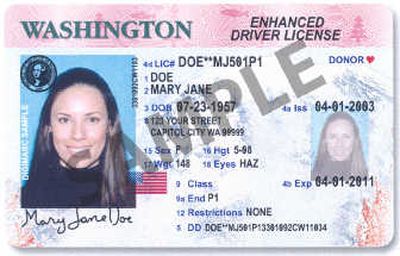License to cross the border

Idaho state Rep. George Eskridge is worried that new homeland security rules could put a crimp in the easy, back-and-forth trade and travel that his North Idaho district has long had over the border with Canada.
So Eskridge is proposing that Idaho follow Washington’s lead and start issuing enhanced driver’s licenses allowing residents to cross back and forth without a $97 passport. Washington’s program, through a special agreement with the U.S. Department of Homeland Security, starts in January, and 26 states, including Idaho, are now looking to copy it.
“Our relationship with Canada is unique – it’s a friendly relationship, it’s a stable relationship, we’ve got friends and relatives across the border,” said Eskridge, R-Dover. “We just don’t want to ruin that relationship.”
But legislation passed by Congress in 2004 requires passports for travelers – including U.S. citizens – who enter the country from elsewhere in the Western Hemisphere, including Canada, Mexico and the Caribbean. That requirement already is in effect for air travelers, and it’s supposed to kick in for land and sea crossings as well in the coming year.
Congress is looking at delays, possibly to June 2009, since U.S. passport applications are so backed up that it’s taking weeks or months for travelers to get passports. But Homeland Security announced on Dec. 3 that border crossing security will go up a notch anyway on Jan. 31: As of that date, all U.S. and Canadian citizens will need both a government-issued photo ID, such as a driver’s license, and proof of citizenship, such as a birth certificate. Previously, birth certificates were recommended but not required. For children, only a birth certificate will be required.
Washington passed legislation last spring to start a pilot program issuing the enhanced driver’s license. But now it’s expanded and is no longer a pilot. The enhanced license will cost $15 more than a regular driver’s license or ID card, and will certify that the holder is a U.S. citizen. The license also will contain a radio frequency chip that can be scanned by border agents, along with electronic text. But it’ll still look pretty much like a regular driver’s license.
Matt Morrison, executive director of the Pacific Northwest Economic Region, a cross-border partnership between five states and three Canadian provinces that works to eliminate barriers in commerce and trade, said, “It’s all about the procedures at the driver’s license bureau – it’s not about the card.”
But he said the card will be a handy substitute for a passport, and will allow “spontaneous” border crossings to continue. Morrison said he has a passport, but he doesn’t always carry it with him. “I can have something in my wallet, if I happen to be in Bellingham, I can go to Vancouver or to Victoria. That’s what we want to continue to support, is the spontaneous travel that does occur between our jurisdictions.”
Eskridge is the current president of the cross-border partnership, which includes legislators and officials from both nations, and he’s working on legislation this year to start an Idaho version of Washington’s program. British Columbia also is working on an enhanced driver’s license program for its citizens, so that the program will work both ways.
Eskridge emphasized that the enhanced licenses are “strictly voluntary.” Only those who want to apply for them will get them.
Gigi Zenk, communications director for the Washington state Department of Licensing, said Washington expects to issue about 300 of the special licenses in the first year of the program.
“It suits our population quite well, because we are right on the border with British Columbia, and we’re used to crossing back and forth,” she said. Washington Gov. Chris Gregoire, when she signed Washington’s legislation into law in March, noted that the 2010 Winter Olympics are coming up in British Columbia. She called the enhanced licenses “a way to boost security at our border without hampering trade and tourism.”
Said Eskridge, “We have substantial trade and I don’t want to see us lose that. … I’m really concerned that we don’t go overboard and just make it worse than we need to make it in order to keep both countries secure. Canada is one of our biggest trading partners.”